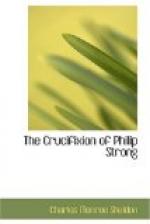“Well, brethren,” he said, “what can we do to help the solution of these questions? Is the church of America to have no share in the greatest problem of human life that agitates the world to-day? Is it not true that the people in this town regard the Church as an insignificant organization, unable to help at the very point of human crisis, and the preachers as a lot weak, impractical men, with no knowledge of the real state of affairs? Are we not divided over our denominational differences when we ought to be united in one common work for the saving of the whole man? I do not have any faith in the plan proposed to give our benevolence or to district the town and visit the poor. All those things are well enough in their place. But matters are in such shape here now and all over the country that we must do something larger than that. We must do as Christ would do if He were here. What would He do? Would He give anything less than His whole life to it? Would He not give Himself? The Church as an institution is facing the greatest opportunity it ever saw. If we do not seize it on the largest possible scale we shall miserably fail of doing our duty.”
When the meeting adjourned Philip was aware he had simply put himself out of touch with the majority present. They did not, they could not, look upon the Church as he did. A committee was appointed to investigate the matter and propose a plan of action at the next meeting in two weeks. And Philip went home almost bitterly smiling at the little bulwark which Milton churches proposed to rear against the tide of poverty and crime and drunkenness and political demagogy and wealthy selfishness. To his mind it was a house of paper cards in the face of a tornado.
Saturday night he was out calling a little while, but he came home early. It was the first Sunday of the month on the morrow, and he had not fully prepared his sermon. He was behind with it. As he came in, his wife met him with a look of news on her face.




